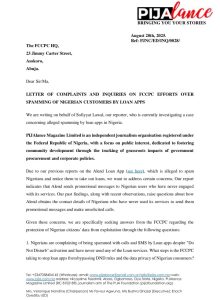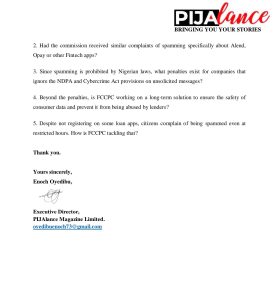
One Year after PIJAlance Exposé, Alend, Other Loan Apps Still Prey on Nigerians’ Privacy
Unlimited complaints of privacy breaches, aggressive loan marketing, and the murky connections between digital lenders raise questions about data sharing in Nigeria’s fintech space. Sofiyyat Lawal reports.
For two months now, Mr Uzo Eyinama’s (not real name) phone has disturbingly blared with marketing calls and Short Message Service (SMS) texts, all of which are trying to lure him to get a loan. ALERT: Alend Loan App that Spams Nigerians, Operates Under Pseudonym
Eyinama, who is a Lagos-based real estate agent, describes this as “harassment and economic slavery.”
This is because he has never used any of these loan apps. Yet they have his number and call and text him regularly. But what he did not know was that he was not alone.
Last year, PIJAlance released a series of reports on loan app spamming activities, taunting Nigerians into a predatory lending scheme.
One of the loan apps at the forefront of spamming, listed in the reports, was Alend.
Bothered by unsolicited calls and messages on August 12, 2025, Eyinama reached out to PIJAlance. Surprisingly, everything he says points back to the Alend loan app.
“I googled this Alend loan app people, and your August 2024 report on audacious spamming of individuals came up. I don’t want their economic slavery; These people need to deliver me.
“I have never had anything to do with this particular loan app. I have sworn since 2022 not to have anything to do with them (loan app) again,” Eyinama told PIJAlance.
Eyinama said he has been getting provocative loan-offer messages from the Alend loan app.
He would disregard the messages, deleting them as they dropped and even blacklisted the numbers. But these were rituals that could not set him free. “They contact me daily with newly-generated numbers,” he said.

“Alend places a call to me at any time they want. It has made it a habit to send SMS when I don’t pick up their calls. Calling me as if I owe them. They call me to put me into economic slavery. It is an offence to disturb. It is spamming.”
Eyinama was right, spamming is illegal in Nigeria. It was first made unlawful in Section 37 of the 1999 Constitution of the Federal Republic of Nigeria (as amended), and then, further emphasised in Nigeria’s Cybercrime Act (2024). The section in the CFRN clearly preserves Nigerians’ rights to privacy, barring anyone from interfering without an express, authoritative and lawful consent.
Section 24 of Nigeria’s Cybercrime Act explicitly states that “spamming with intent to disrupt the operations of a computer, be it public or private or financial institutions,” is illegal.
Anyone found guilty will receive at least three years’ jail terms or between N1,000,000 to N5,000,000 fine or both. Despite this, PIJAlance can confirm that Alend has been spamming Nigerians since it was launched last year.
Eyinama said Alend Loan App customer service started sending him a message, showing his eligibility to take N670,000 worth of loan, since June.
“They have even called me on the Airtel line I use to browse, and I never shared that number at all. So, probably Opay shared that with them. I really don’t know how these people gain access to one’s privacy,” he told PIJAlance.
There have been numerous complaints similar to Eyinama’s. A reverse search on social media shows a list of complaints made by Nigerians about Alend Loan App spamming.

The Federal Competition and Consumer Protection Commission (FCCPC) has repeatedly warned Loan Apps against any form of harassment while urging victims to report any such cases to the commission, assuring them that a proper investigation will be carried out. But lethargy has marred the effective enforcement of the directives.
From Okash to EaseMoni, then Alend; Spamming Reigns Replete
Before receiving the spam messages from Alend, Eyinama already faced a confusing debt notice in May. It was at that time Okash informed him of his outstanding debt he had already defaulted on by one month, and he was required to pay back. Apparently, he had no idea when he had incurred the debt. The platform claimed he owed Okash, but later transferred the debt to EaseMoni.
“On the 11th of May, they told me that I’ve defaulted by one month to pay back a loan. I asked myself when I borrowed a loan. I contacted them when I borrowed a loan, and they told me that maybe someone had accessed my phone. Opay said I borrowed money from Okash, a partner of Opay, then Okash transferred me to easemonie, and I ended up paying a loan I did not incur, and I told them not to disturb me again. This made me stop using Opay.”
Though he insisted he never took the loan, he ended up paying N98,050 to Easemoni in June, describing the pressure tactics deployed as “terrible.”
“The interest rate is much as well. I had the opportunity to calculate how much interest is being added per day (N800 -N1000) after I was identified as a defaulter,” he added.
However, the biggest shock for Eyianama came weeks later when Alend began contacting him. He understood that there is a relationship between Easemoni, OKash and Opay, but he was more bothered that his database had either been transferred or sold in the loan ecosystem.
“I wonder where they get the database, or maybe they sell management to each other and transform the name of the company because I’m confused on why Alend and Fairmoney are coming to me,” he said.
Alend Manager went Silent on Spam Inquiry
Stanley Jacob, the Manager of Alend Loan App, was contacted by PIJAlance regarding the allegations against their mode of operation. At first, he told the reporter to message him later that he was in a meeting.
Hours later, our reporter contacted Jacob again, and he went mute. Several subsequent attempts made to speak with him afterwards proved completely abortive.
Meanwhile, Jacob, in our previous report, told PIJAlance that Alend spams Nigerians on a legal ground. read here.
FCCPC Confirms Penalty for Spamming

PIJAlance contacted FCCPC, established to manage complaints and consumers’ queries relating to the quality of products consumed. An official, who craved anonymity for lacking the prerogative to speak to the press, explained that there are penalties for any loan app registered under the commission found guilty of spamming people. PIJAlance found that FCCPC gives Alend full approval to operate as a digital lending platform through its parent company, LittleAnt Limited.
“If a loan app is registered with FCCPC (information on the registered app is available on the website), then actions can be taken. The official also confirmed that the commission has been receiving complaints about some loan apps,” the official said. But could not specifically state if Alend was among.
PIJAlance further submits an official letter detailing specific questions relating to Alend. Initially, the commission had requested a soft copy of the letter to be sent via email. Despite complying, no response was received, and the reporter was later directed to submit the letter physically at the nearest office.
As of the press time, Alend spamming continues.
Read Also: Predatory Lending: Privacy Invasion: Nigeria Loan Apps Continue to Wax Stronger Flouting FCCPC Rules



